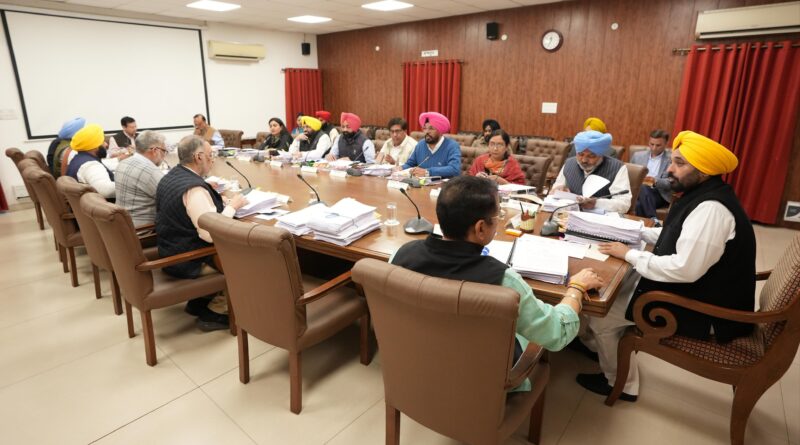LED BY CM CABINET DECIDES TO CONVERT 3842 TEMPORARY POSTS OF JUDICIAL WING INTO PERMANENT POSTS AFTER TWO DECADES
Chandigarh: In a significant decision, the Punjab Cabinet led by Chief Minister Bhagwant Singh Mann on Saturday gave its consent to convert 3842 temporary posts of judicial wing posted in the Subordinate Courts across the state into Permanent Posts.
A decision to this effect was taken by the Council of Ministers in a meeting held under the chairmanship of the Chief Minister here at his official residence today.
Disclosing this here today a spokesperson of the Chief Minister’s Office said the Cabinet also accorded its approval to convert 3842 temporary posts of judicial wing posted in the Subordinate Courts across the state into Permanent Posts. These posts were designated as temporary posts for more than two decades and approval of the Department of Home Affairs and Justice along with the Finance department was required every year for their continuation. This will help in eliminating unnecessary hassle in obtaining continuation of posts every year.
In order to ensure speedy trials of POSCO and rape cases, the Cabinet has gave its consent to set up two Fast Track Special Courts in two districts of Sangrur and Tarn Taran to dispose off the pendency of cases pertaining to Protection of Children against Sexual Offences (POCSO) Act and Rape. The establishment of these two Special and Dedicated Courts under the POCSO Act will eliminate the pendency and expedite trial in such cases. The Cabinet has also accorded approval to create 20 posts including two posts of Additional District and Sessions Judge along with 18 supporting staff for these courts.
With an aim to ensure uninterrupted and quality health care services to the residents of the state, the Cabinet gave consent to revive 189 posts of Medical Officer (General) and create 1390 such additional posts. This decision has been taken in larger public interest to overcome the shortage of Medical Officers in the state. The 1940 vacant posts of Medical Officers (General) will be filled through the Baba Farid University of Health Sciences, Faridkot, after taking them out of the purview of the Punjab Public Service Commission (PPSC).
The Cabinet also gave its consent to create 20 new posts including four Medical Officers, five Staff Nurses, pharmacist, lab technician, X-Ray technician, OT Assistant, two Multitask worker, specialist Doctors including Gynecologists, pediatrician, surgeon, Medicine and Dentist for the newly upgraded urban Community Health centre at Gurdaspur. Pertinently, the state government has recently upgraded this Urban Primary Health centre into a 30 bedded Community Health centre at Gurdaspur to impart quality health services to people in the border district.
The Cabinet also gave ex-post facto approval to setting up of 829 Aam Aadmi Clinics (AAC) out of which 308 are located in urban areas and 521 in rural areas. These clinics are acting as cornerstone in revamping the Healthcare system in the state by imparting quality health services to people right at their doorsteps. These clinics are providing 80 essential drugs and 38 different types of diagnostic tests to people and till March 7 a total footfall of 1. 12 crore patients have been recorded in these clinics along with 31.69 lakh diagnostic tests.
The Cabinet also gave nod to the “The Punjab Food grains Transportation Policy 2024” and ‘The Punjab Labour & Cartage Policy, 2024’ for the smooth and hassle free transportation of Food grains in the state of Punjab. Pertinently the Government of Punjab through its State Procurement Agencies and FCI procures food grains from various designated centres/ mandis. As per the policy during the year 2024, food grain transportation works will be allotted through a competitive and transparent online tender system.
The Cabinet also gave its nod to the ninth Annual Administrative Report of the Civil Aviation Department for the year 2022-23.
The Cabinet also gave approval for enhancing the benefits of Health insurance cover to the traders having turnover upto Rs 2 crore instead of existing Rs 1 crore. This will benefit more than one lakh traders of the state as they will be able to get free treatment upto Rs 5 lakh under this scheme. This issue was flagged before the Chief Minister during the ongoing Sarkar Vyapaar Milni by the traders after which a decision was taken.
The Cabinet also gave nod to One Time Settlement scheme 2023 for VAT payment from March 31 to June 30. This is a big relief to the traders of the state as this scheme launched last year had already got overwhelming response from the trades. This scheme has already collected Rs 47.50 crore through 41814 applications received from the traders whereas the collections of OTS 2021 were merely Rs 4.37 crore and that of OTS II were only Rs 4.93 crore.
The Cabinet also gave consent to give 18 months to the colonizers for submitting the pending arrears of External Development Charge in three installments. External Development Charges are collected by Development Authorities from the promoters of Mega/PAPRA Projects as per the rates notified by the Government from time to time. These External Development Charges are utilized by Development Authorities to provide infrastructure/Strengthening of already provided infrastructure in the vicinity of the Projects. It has been decided to reschedule the installments of the overdue EDC in three six monthly instalments by charging interest @ 10% per annum and Promoter shall be required to hypothecate their property against the rescheduled amount.
The Cabinet also approved the Excise Policy for the year 2024-25 which is the third policy of this government. For the first time the target collection of the government is expected to cross Rs 10,000 crore. The collection from Excise during previous Congress regime was merely Rs 6151 crore and the new policy envisages the allotment of liquor vends through draw, adding that instead of 172 groups this time 232 groups have been constituted.
The Cabinet also gave nod to the last-mile delivery of ration project, making it easier for senior citizens, differently-abled individuals, war widows and others to access their rations. It ensures quality and hygiene and around 30 lakh beneficiaries will have the option to receive clean, hygienic packaged wheat flour with a 45-day shelf-life, complying with quality specifications prescribed by FSSAI. It will save the time and effort of the beneficiaries and enhance their convenience greatly while ensuring higher transparency and plugging leakages and other malpractices such as under-weighing etc.


